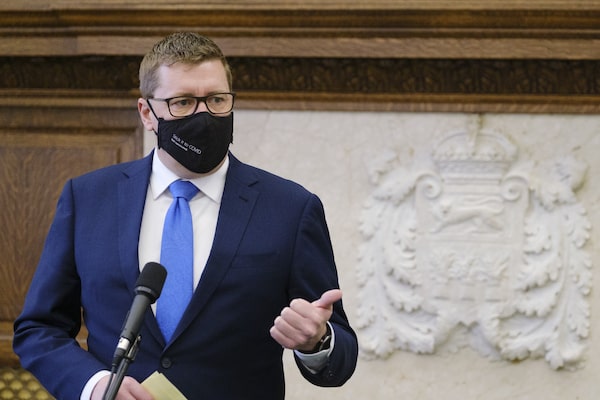
Saskatchewan Premier Scott Moe speaks in Regina, on April 6.Michael Bell/The Canadian Press
Saskatchewan Premier Scott Moe is complaining that Ottawa is playing favourites on carbon pricing after the federal government rejected the province’s proposal for its own framework to replace the federal levy on greenhouse gas emissions.
In the wake of a Supreme Court ruling in March affirming the federal government’s power to impose carbon pricing – the purpose of which is to increase the cost of consuming fossil fuels – Premier Moe said his province would propose a plan similar to that of several Atlantic provinces, where reductions to existing fuel taxes have softened the impact of the carbon levy.
“The Trudeau government cannot have one standard for the east and another for the west,” Mr. Moe said in a post on his official Twitter account. “We have long said that Saskatchewan is a part of the solution, it’s about time they recognize it.” In a later tweet, he claimed Saskatchewan’s rejected proposal “closely aligns” with approaches that Ottawa had accepted in other provinces.
The federal Liberal government contends it is simply not accepting any new equivalency agreements while it prepares a revised, and tighter, set of national standards, meaning Saskatchewan would not be able to implement its own system until January 2023.
But Mr. Moe is taking that as a rejection of Saskatchewan’s plans on its merits, rather than on its timing, and claiming Saskatchewan is being held to a higher standard than its Atlantic counterparts.
Mr. Moe’s complaints brush by a couple of fundamental realities, and his claims of parity with other provinces fall short. Ottawa is already moving to tighten the national benchmarks, likely meaning the policy deviations in the eastern provinces will either be unwound or, at a minimum, not allowed to grow. But more important, Saskatchewan’s accusations of unfairness ignore the fact that the province’s proposal on carbon levies for motor fuels went far beyond any measure taken in New Brunswick, Prince Edward Island or Newfoundland and Labrador.
Saskatchewan’s plan would have accepted the current carbon price of $40 a tonne, which translates into an added 8.84 cents a litre for gasoline in 2021. But after that point, the province proposed reducing its existing gasoline excise tax to offset half of future increases in carbon charges, through to 2030. As the chart below shows, that would have created a growing gap between the carbon price in Saskatchewan and the federal benchmark and, eventually, a gap with the Atlantic provinces that have already trimmed their fuel taxes.
If Saskatchewan’s proposal had been accepted, the incremental carbon charge for gasoline in the province would have been lower than the federal benchmark in all but the current year. By 2030, that gap would have grown to more than 14 cents a litre. Effectively, that means the carbon price for motor fuels in Saskatchewan would have been $105 per tonne of greenhouse gas equivalents versus the planned federal benchmark price of $130 a tonne.
It’s true that in the first few years, Saskatchewan’s pricing proposal would be comparable to the Atlantic provinces, assuming Ottawa doesn’t require New Brunswick, PEI and Newfoundland to reverse their cuts to motor-fuel excise taxes. Until 2025, the carbon charge in Saskatchewan would be higher than in the three Atlantic provinces. But over the next two years, the slower rate of increase in carbon charges in Saskatchewan would push that province to the bottom of the pack. The gap would continue to grow until 2031, when Saskatchewan would have eliminated the entire 15-cent-a-litre excise tax.
So, when Premier Moe complains of a double standard, he’s really complaining about different plans being treated differently.
That being said, Ottawa has tolerated deviations from federal standards for carbon pricing, at least until now. Besides the offsetting reductions in fuel taxes, the three Atlantic provinces have also formally or effectively exempted home heating fuels from carbon charges. (Such fuels are technically subject to carbon pricing in New Brunswick, but the province rebates those charges penny for penny.)
Will that tolerance continue? The federal environment department says it is premature to discuss specific situations, with updated – and tighter – benchmarks due to be released in the next couple of weeks. But the department did note in an e-mail that tax changes that undermine or weaken carbon pricing raise concerns. In an interview shortly after the Supreme Court decision, Environment and Climate Change Minister Jonathan Wilkinson said he believed the federal benchmark needs to be strengthened. (He was not available to comment for this article.)
PEI has indicated that it does not believe Ottawa will continue to allow home heating fuels to be exempted from carbon pricing under the upcoming benchmarks. And the three provinces have already changed course on offsetting carbon charges on motor fuels, with no additional reductions in existing excise taxes since 2020. New Brunswick’s change in direction was most conspicuous, with the province saying it will focus on reducing income taxes with the proceeds from carbon pricing.
Mark Jaccard, a professor at Simon Fraser University’s School of Resource and Environmental Management, said academic economists and environmentalists have been increasingly “suspicious” about how well federal carbon pricing will work if Ottawa continued to carve out exceptions in agreements with the provinces. “We’ve been rumbling about this,” he said in an interview.
Prof. Jaccard said there’s pressure on Ottawa to revisit the federal benchmark to ensure carbon pricing approaches are “relatively consistent” across the country, while noting that such rules do not need to be identical. What’s important, however, is that the intent of carbon pricing – to increase the cost of consuming a unit of fossil fuel – is preserved. Offsetting reductions in gasoline taxes don’t clear that bar, he said. “That obviously subverts the policy.”
Isabelle Turcotte, director of federal policy for the Pembina Institute, said she believes there should be a single standard for carbon charges for motor fuels, particularly since carbon pricing is doing much of the “heavy lifting” for Canada’s effort to reduce greenhouse gas emissions. Ms. Turcotte said she is encouraged by Ottawa’s rejection of Saskatchewan’s plan, adding she did not view it as a serious proposal.
In 2018, the federal government announced that all provinces would need to implement a carbon-pricing system by April 1, 2019 and those that didn't would fall under a federal carbon tax. But what is carbon pricing anyway?
Tax and Spend examines the intricacies and oddities of taxation and government spending.
Sign up for the Tax and Spend newsletter.
 Patrick Brethour
Patrick Brethour